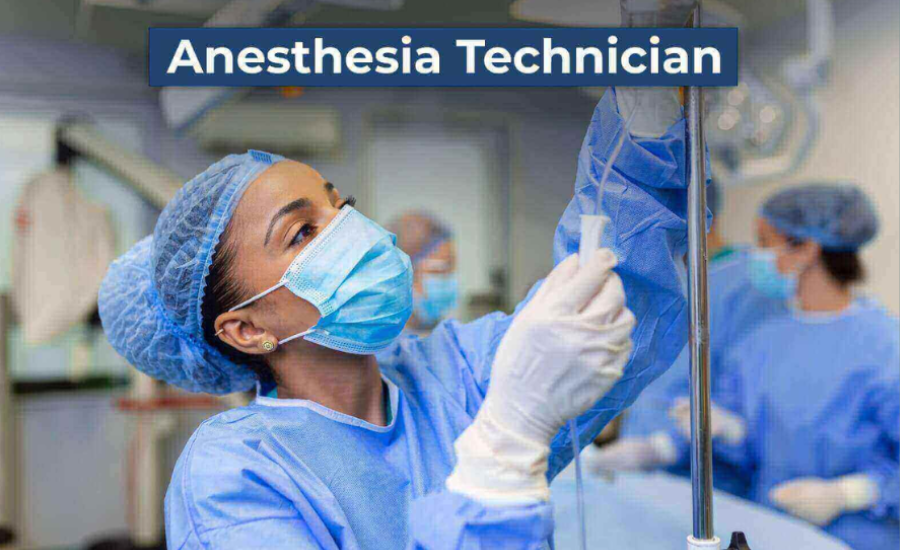Comprehensive Guide to Building a Career as an Anesthesia Technician: Insights on Anesthesia Tech Salary
Pursuing a career as an anesthesia technician combines healthcare expertise and technical proficiency, making it an attractive field for those who enjoy working in fast-paced, dynamic environments. In this critical role, you’ll collaborate with anesthesiologists, surgeons, and nursing teams to ensure patient safety during surgeries and medical procedures. This career not only offers meaningful contributions to healthcare but also comes with a promising anesthesia tech salary, reflecting the critical nature of the role. Whether you’re passionate about technology, patient care, or both, this guide outlines everything you need to know to start your journey.
Who is an Anesthesia Technician?
An anesthesia technician is a specialized healthcare professional who ensures that anesthesiologists have the tools and support necessary for smooth and safe surgical procedures. This role requires a thorough understanding of anesthesia-related machinery, including ventilators, monitors, and safety devices. You’ll also assist in patient preparation and ensure compliance with safety protocols during surgeries.
As an anesthesia technician, your work environment might vary widely, from bustling hospital operating rooms to outpatient surgical centers and intensive care units (ICUs). You’ll be expected to adapt to different scenarios, such as trauma emergencies, routine operations, or specialized procedures in fields like pediatrics or cardiology.
The anesthesia tech salary can vary depending on your level of experience, certifications, and the healthcare facility where you work. Professionals in high-demand areas, such as trauma centers or advanced surgical units, often earn more due to the complexity of their roles.
Core Responsibilities of an Anesthesia Technician
Anesthesia technicians play a multifaceted role, balancing technical expertise and patient care.
Preparing Anesthesia Equipment
Before any surgical procedure, it’s your job to ensure all anesthesia equipment is clean, functional, and ready for use. This involves assembling complex machinery, calibrating monitors, and inspecting devices like vaporizers, oxygen tanks, and blood gas analyzers. Post-procedure, you’ll clean and sterilize equipment to maintain strict hygiene standards. A consistent commitment to preparation ensures patient safety and smooth surgical operations.
Assisting During Procedures
During surgeries, your role becomes more hands-on. You’ll monitor the patient’s vital signs, adjust equipment as needed, and troubleshoot issues promptly. You’ll also collaborate with the anesthesiologist to address any complications, making quick decisions that directly impact patient outcomes.
Maintaining and Repairing Equipment
Routine maintenance is essential for preventing equipment malfunctions. This includes performing daily checks, identifying wear and tear, and coordinating timely repairs. Ensuring the proper functioning of machines and maintaining a consistent inventory of anesthesia supplies minimizes risks during procedures.
Patient Engagement and Care
Your interactions with patients often begin before surgery. Providing clear explanations about the anesthesia process and offering reassurance can ease patients’ anxieties. After surgery, you may assist in transferring patients to recovery and monitoring their initial post-operative condition. Compassionate communication is key to building trust with patients and their families.
Inventory and Medication Management
Anesthesia technicians are responsible for managing the stock of anesthesia supplies and medications. You’ll track inventory, place orders for essential items, and ensure medications are stored under optimal conditions. Familiarity with pharmacological protocols is vital to maintain compliance with safety regulations.
As you gain experience and take on additional responsibilities, your anesthesia tech salary may increase, especially if you specialize in areas like trauma care, pediatrics, or advanced surgical technologies.
Essential Skills for Success
Excelling as an anesthesia technician requires a unique blend of technical skills, medical knowledge, and interpersonal abilities. Below are the essential skills you’ll need to thrive:
Proficiency with Equipment
Anesthesia equipment is sophisticated and requires thorough knowledge of its operation, maintenance, and troubleshooting. Keeping up-to-date with emerging technologies ensures you remain effective in your role and can boost your career prospects and salary.
Understanding Anesthetic Drugs
You’ll need a solid understanding of the various anesthetic agents used during surgeries, their storage requirements, and their potential side effects. Familiarity with these drugs minimizes risks and ensures their safe administration.
Attention to Detail
Every detail matters in an operating room, from monitoring vital signs to ensuring equipment functions correctly. Your ability to identify potential issues and address them proactively is critical.
Stress Management and Adaptability
Operating rooms are high-stakes environments where quick thinking is essential. Remaining calm under pressure allows you to handle emergencies effectively and support the surgical team during unexpected challenges.
Commitment to Continuous Learning
The healthcare field evolves rapidly, with new technologies and best practices emerging regularly. Staying informed and pursuing ongoing education keeps your skills sharp and your anesthesia tech salary competitive.
Salary Expectations
An anesthesia technician’s salary is influenced by factors such as experience, certifications, and geographic location. Entry-level positions typically offer around $44,066 annually, while mid-career professionals can earn between $47,334 and $47,827. Those with advanced expertise in specialized areas, such as pediatric or trauma anesthesia, may earn upwards of $57,976 per year.
Investing in additional certifications and training can significantly boost your earning potential. Specialized roles in high-demand fields or prestigious healthcare institutions often come with higher salaries and benefits.
Steps to Becoming an Anesthesia Technician

If you’re ready to pursue this rewarding career, follow these steps to get started:
Understand the Role
Shadowing professionals in the field can provide valuable insight into the daily tasks and responsibilities of an anesthesia technician.
Complete High School Education
Focus on science and math courses, such as biology, chemistry, and computer science, to build a strong academic foundation for further studies.
Enroll in a Specialized Training Program
Choose an accredited program that offers hands-on training, including internships. Hybrid programs, such as those at AIMS Education, combine online learning with in-person sessions for flexibility.
Gain Practical Experience
Internships are essential for developing real-world skills and building professional connections. Working alongside seasoned technicians will refine your expertise.
Obtain Certification
While not always mandatory, certifications like the Certified Anesthesia Technician (Cer.A.T.) credential can enhance your qualifications and increase your anesthesia tech salary.
Apply for Positions
With your training and certification in hand, start applying for roles in hospitals, surgical centers, or specialized care units. Networking within the healthcare industry can help you find opportunities in your desired area.
By following these steps and continually enhancing your skills, you can enjoy a fulfilling career as an anesthesia technician, with a competitive salary and opportunities for growth.
Frequently Asked Questions (FAQs) about Anesthesia Tech Salary
Q: What qualifications are required to become an anesthesia technician?
A: To become an anesthesia technician, you’ll need a high school diploma with a focus on science and math. Completing a specialized training program and obtaining certification, like the Certified Anesthesia Technician (Cer.A.T.), can boost your career prospects.
Q: Is certification mandatory to work as an anesthesia technician?
A: Certification demonstrates your expertise, increases your employability, and can positively impact your anesthesia tech salary.
Q: What does a typical day for an anesthesia technician look like?
A: A typical day involves preparing and maintaining anesthesia equipment, assisting anesthesiologists during surgeries, monitoring patient vital signs, and managing inventory of anesthesia supplies. The role requires adaptability, as no two surgeries are the same.
Q: Where can anesthesia technicians work?
A: Anesthesia technicians primarily work in hospitals, outpatient surgical centers, and intensive care units (ICUs). Some may also find opportunities in trauma centers, specialized pediatric or cardiac surgery units, or private practices.
Q: What is the average anesthesia tech salary?
A: The salary varies based on experience, certifications, and location. Entry-level technicians can earn around $44,066 annually, while experienced professionals in specialized roles may earn up to $57,976 or more.
Q: Are there growth opportunities in this field?
A: Yes, anesthesia technicians can advance their careers by gaining experience, obtaining advanced certifications, or specializing in areas like pediatric anesthesia or trauma care. Leadership roles or transitioning into anesthesiology assistant positions are also potential growth paths.
Q: How long does it take to become an anesthesia technician?
A: Training programs typically take 1–2 years to complete. Including internships and certifications, you can become job-ready in about 2–3 years.
Q: Is this a high-stress career?
A: Operating rooms are high-pressure environments, but proper training, stress management, and experience can help you thrive in this rewarding field.
Conclusion
A career as an anesthesia technician offers a rewarding blend of healthcare and technology, focusing on preparing and managing anesthesia equipment, assisting in surgeries, and ensuring patient safety throughout medical procedures. This dynamic role provides opportunities to work in various healthcare settings and is both fulfilling and impactful. The anesthesia tech salary reflects the vital importance of this position, with competitive earnings that grow with experience, certifications, and specialization. By pursuing strong academic preparation, specialized training, and continuous learning, professionals in this field can achieve personal and professional growth while contributing to the success of life-saving surgeries and exceptional patient care.
Read Next: tanzohub






